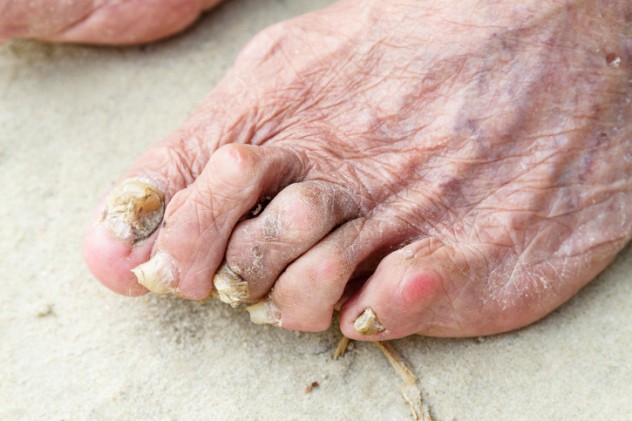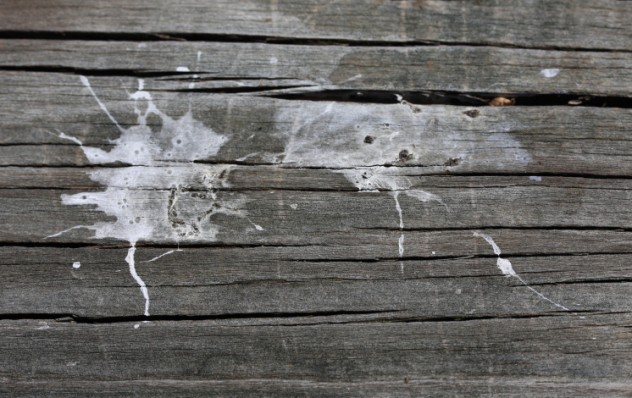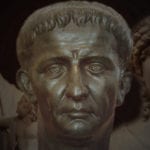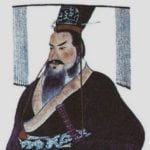 History
History  History
History  Weird Stuff
Weird Stuff 10 Wacky Conspiracy Theories You Will Need to Sit Down For
 Movies and TV
Movies and TV 10 Weird Ways That TV Shows Were Censored
 Our World
Our World 10 Places with Geological Features That Shouldn’t Exist
 Crime
Crime 10 Dark Details of the “Bodies in the Barrels” Murders
 Animals
Animals The Animal Kingdom’s 10 Greatest Dance Moves
 Movies and TV
Movies and TV 10 Box Office Bombs That We Should Have Predicted in 2025
 History
History 10 Extreme Laws That Tried to Engineer Society
 History
History 10 “Modern” Problems with Surprising Historical Analogs
 Health
Health 10 Everyday Activities That Secretly Alter Consciousness
 History
History 10 Dirty Government Secrets Revealed by Declassified Files
 Weird Stuff
Weird Stuff 10 Wacky Conspiracy Theories You Will Need to Sit Down For
 Movies and TV
Movies and TV 10 Weird Ways That TV Shows Were Censored
Who's Behind Listverse?

Jamie Frater
Head Editor
Jamie founded Listverse due to an insatiable desire to share fascinating, obscure, and bizarre facts. He has been a guest speaker on numerous national radio and television stations and is a five time published author.
More About Us Our World
Our World 10 Places with Geological Features That Shouldn’t Exist
 Crime
Crime 10 Dark Details of the “Bodies in the Barrels” Murders
 Animals
Animals The Animal Kingdom’s 10 Greatest Dance Moves
 Movies and TV
Movies and TV 10 Box Office Bombs That We Should Have Predicted in 2025
 History
History 10 Extreme Laws That Tried to Engineer Society
 History
History 10 “Modern” Problems with Surprising Historical Analogs
 Health
Health 10 Everyday Activities That Secretly Alter Consciousness
10 Of The Most Gruesome Deaths In Mythology
If there was a time warp tomorrow and we all got transported into the world of classical myths, most of us would probably die horrendous and peculiar deaths. The percentage of characters in Greek and Roman myths who die peacefully in their beds of old age is practically zero—the vast majority meet gruesome and twisted ends.
10 Procrustes’s Iron Bed

Procrustes was a rogue son of Poseidon who kept an inn between Athens and Eleusis. When travelers asked to spend the night, he would offer them an iron bed and then spring a trap on them. If they were too tall for the bed, he would chop them down to size, and if they were too short, he would stretch them to the right length. The worst of it was that no one ever actually fit the bed: Procrustes kept two beds to make sure.
Eventually, Theseus (son of Poseidon and Aegeus) stopped at the inn on his way to free Athens from the minotaur. Theseus managed to escape Procrustes’s trap and then kill Procrustes by making him fit his own bed.
9 Nisus’s Magic Purple Hair

Ovid’s Metamorphoses explains how Nisus was King of Megara and was betrayed by his daughter (Scylla) when his realm was attacked by King Minos of Crete. It had been decreed by fate that so long as a special strand of purple hair remained on Nisus’s head, he would be invincible. But Scylla fell in love with Minos and decided to help him out by cutting the purple hair from her father’s head while he slept. Without his magic hair, Nisus died, and Megara was conquered.
Unfortunately, it all backfired on Scylla in the end. Minos was unimpressed by her lack of fatherly love and didn’t want anything to do with her. On top of that, she tried to swim after his boat as he left Megara, and her father, who had transformed into an eagle after he died, swooped down, and pecked her to death.
8 Narcissism

Narcissus was the beautiful son of the river god Cephissus and the nymph Liriope. It was prophesied that he would have a long life—provided that he never saw himself. A boy called Ameinias fell in love with him, but Narcissus did not return these feelings, so Ameinias killed himself in his grief and called on Nemesis to avenge him. As a result, Narcissus spied his reflection in a stream one day and sat there until he starved to death, transfixed by his own beauty. The flower that grew on the spot where he died is his namesake.
7 Sisyphus And The Boulder

Sisyphus was the first king of Corinth, and he was also the most deceitful man who ever lived—so much so that the gods decided he should die by being escorted to Tartarus by Hades himself and sentenced to an eternity of hard labor. However, in a bid for freedom, the sly Sisyphus tricked Hades into accidentally locking himself in his own handcuffs, so Sisyphus thought he’d got off scot-free. But Hades being out of action caused mayhem, as no one could die. In irritation, the gods freed Hades and increased Sisyphus’s punishment. Not only did he have to labor forever, his job would now be eternally frustrating. He was required to roll a boulder up a hill. However, each time he managed to reach the summit, the boulder would roll to the bottom again—and so on for all eternity.
6 Erysichthon’s Hunger

Erysichthon was the impious King of Thessaly, who cut down the goddess Demeter’s sacred grove in order to expand his palace. His name translates to “earth-tearer,” and his profane actions were ultimately his downfall. The crowning glory of the grove was an ancient oak covered in votive wreaths, which were a symbol of Demeter’s generosity. Erysichthon’s men refused to fell it out of respect for the goddess, so Erysichthon grabbed an axe and cut it down himself, killing a dryad nymph in the process. Demeter punished him by cursing him with endless hunger: He ate all the food in the kingdom and spent all his riches buying more. Poverty drove him to sell his daughter Mestra into slavery, and he eventually died devouring his own flesh.
5 Being Slaughtered By A Family Member

Mythology is full of families murdering one another. Euripides’s play shows us how Medea’s husband Jason cheated on her, so she killed their sons to get revenge. King Agamemnon sacrificed his daughter Iphigenia to the Gods to ask for a better wind on the way home from the Trojan War. Romulus quarreled with his brother Remus and clubbed him to death on the future site of Rome. Oedipus unknowingly killed his father on the way to Thebes. Orestes killed his mother, Clytemnestra, to avenge the death of his father, as Aeschylus tells us in yet another tragedy. Zeus cut his father Cronos into 1,000 pieces with a sickle and scattered the pieces in the deepest part of the underworld. Hercules was driven mad by Hera, so he accidentally killed his whole family. We could go on all day.
4 Eaten By Cyclopes

On his way home to Ithaca, Odysseus and his crew ran into some trouble, some of which involved getting stuck on the island of the cyclopes—huge, savage monsters with only one eye. Odysseus and his men were captured by a cyclops called Polyphemus and locked up in a cave with the cyclops’s flock of sheep—Polyphemus’ stash of fresh-and-ready meals. Odysseus’s men could do nothing but wait in terror for the monster’s arrival at mealtime, when he would pick one or two men at random and munch them up. Fortunately, Odysseus came up with a plan to trick Polyphemus and managed to escape, but it was too late for the men who were already devoured by the one-eyed monster.
3 Washing Sinis’s Feet

Sinis was another scoundrel son of Poseidon and was also related to the royal house of Corinth. He was famous for lying in wait for travelers on a route along the Scironian cliffs and asking them to wash his feet. When they kindly agreed and knelt down at his feet to begin, he would kick them off the cliff and into the black waters below—where a giant turtle lay in wait to devour them. Luckily, like Procrustes, Sinis was killed by Theseus, who catapulted him over the cliff after lashing him to a nearby pine tree (an alternative torture method that Sinis sometimes inflicted on passersby). Today, the cliffs on the western side of Sardinia are still known as the Sinis Peninsula.
2 Meeting The Stymphalian Birds

The Stymphalian birds were the pets of Ares, who had beaks of bronze, the ability to turn their metal feathers into missiles, and highly toxic dung. They pillaged villages across Arcadia until Hercules came along on his sixth labor and frightened them away with a krotala—basically a divine rattle that the god Vulcan had custom-made for him. A huge flock of the birds had gathered at the lake of Symphalos; when Hercules brandished the rattle, the birds took to the skies in fright, and Hercules shot down as many of them as possible with his poisoned arrows. The surviving birds fled, never to blight Arcadia again.
1 Getting The Sphinx’s Riddle Wrong

The Sphinx terrorized Thebes for a quite some time by lying in wait at the gates of the city with a riddle for anyone who wanted to gain passage. She strangled and ate anyone who got it wrong, and as she had the back legs of a lion, the wings of a bird, and the face of a woman, this would probably have been a terrifying way to go. Oedipus eventually cracked the riddle (“Which creature has one voice and yet becomes four-footed, two-footed, and three-footed? Answer: “A man.”) and caused the Sphinx to throw herself from her high rock to her death.








